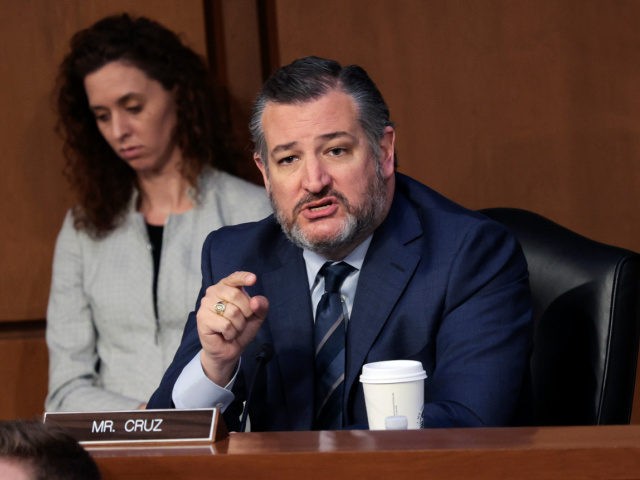Sen. Ted Cruz (R-TX) on Tuesday told President Joe Biden’s Supreme Court nominee Kentanji Brown Jackson that if her views from law school were applied broadly, “civil commitment laws across the country would be struck down, releasing sexual predators.”
Cruz brought up her 1996 Harvard Law Review note during the second day of Jackson’s confirmation hearing, reading aloud excerpts from her major academic worked entitled “Prevention vs. Punishment: Toward a Principled Distinction in the Restraint of Released Sex Offenders.” Cruz argued that Jackson was advocating for the idea that the regulated release of sex offenders — which can require them to register with local law enforcement officials, notify community members of their presence, undergo DNA testing, and submit to civil commitment for an indefinite term — could be seen as unconstitutional if the regulations are viewed as punitive rather than preventative.
“If the views you advocated for in law school prevailed, civil commitment laws across the country would be struck down, releasing sexual predators. And under the argument, community notification and DNA bank laws could well be struck down as well. Is that an outcome that should concern people?” Cruz asked Jackson.
Jackson said she “was not advocating for the striking down of those laws.”
“My note was trying to identify criteria that I thought could be applied consistently to determine whether the laws were punitive or preventative,” she said, later stating that she was looking at four different kinds of laws and did not label them all “punitive.”
In response, Cruz narrowed his critique down to Jackson’s law school take on Civil Commitment laws.
“If you look at Civil Commitment laws, the UCLA School of Law Williams Institute estimates more than 6,300 sex offenders are currently detained by civil commitment programs,” the senator said. “If the view you advocated prevailed, presumably, those 6,300 sex offenders would be released to the public. Is that an outcome that should be concerning?” Jackson replied:
Senator, in law school when I was writing a note, I was looking at a brand new set of laws that had not previously been enacted in any jurisdiction — they were new. I was assessing at the time, as law school students do, what criteria I thought might be used by courts to make a determination in the future as to whether or not they should be treated as punitive and therefore — not unconstitutional — but therefore, ones that carry with them certain rights versus preventative—
Cruz interrupted Jackson to explain that while he understands that the views she may have held as a student could have changed, he believes her view is “one that has continued.”
The GOP senator’s line of questioning was part of a larger line of questioning throughout the hearing: whether Jackson has a sentencing record of being soft on child porn offenders. Jackson’s potential “leniency” in child porn offender cases was first brought to public attention by Sen. Josh Hawley (R-MO) who published a Twitter thread of Jackson’s rulings, interviews, articles, and speeches and accused her of having “a pattern of letting child porn offenders off the hook for their appalling crimes.”
Katherine Hamilton is a political reporter for Breitbart News. You can follow her on Twitter.

COMMENTS
Please let us know if you're having issues with commenting.